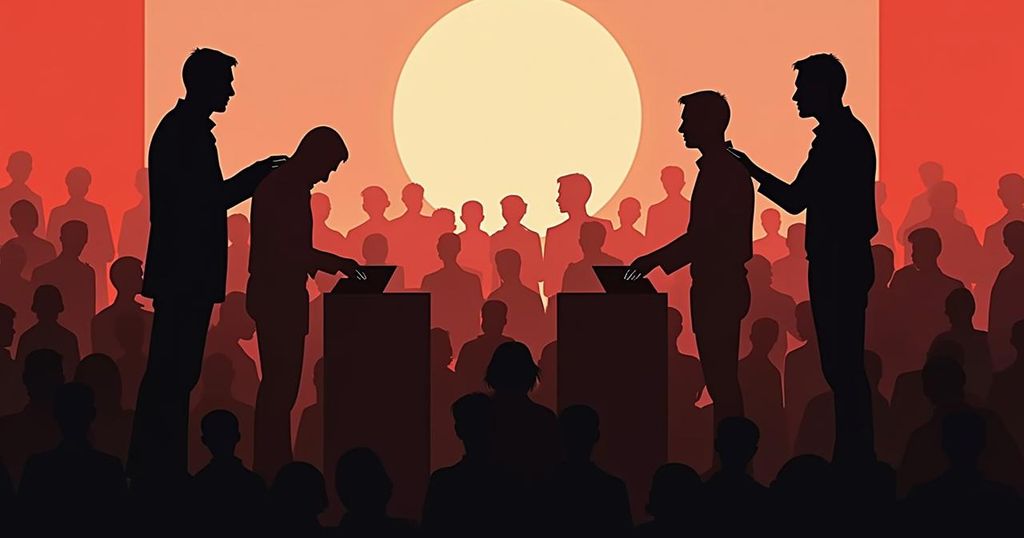Elections in Tunisia: Kais Saied Faces Minimal Opposition Amidst Political Turmoil
Tunisians voted in a presidential election on Sunday, with few believing a change in leadership is possible as many of President Kais Saied’s key opponents are imprisoned or barred from the ballot. This election follows years of political turmoil and economic challenges since the Arab Spring, with Saied’s consolidation of power taking place amidst criticism from pro-democracy advocates. Only three candidates are on the ballot, and opposition groups have largely boycotted the election, branding it illegitimate. The economic climate remains dire, with diminished public trust in leadership.
Tunisians participated in a presidential election on Sunday, where President Kais Saied appears to face little competition, as many of his significant opponents are either imprisoned or barred from the ballot. This election comes five years after Saied’s initial victory, where he capitalized on a wave of anti-establishment sentiment following the ousting of President Zine El Abidine Ben Ali in 2011, which marked the beginning of the Arab Spring. Since then, Tunisia has been recognized as a relatively successful example of democratic change in a region marked by instability. However, despite these advancements, the country has struggled with economic challenges and political discord. Kais Saied, who won the presidency in 2019, positioned himself as an outsider promising to revitalize the government with increased youth and local governance. However, the unfolding political situation indicates a deviation from those promises, particularly after he declared a state of emergency in July 2021, effectively consolidating power and suspending parliamentary activities, actions that drew sharp criticism from pro-democracy factions. The current electoral landscape is stark, as numerous potential candidates were either preemptively sidelined or face legal hurdles that thwart their attempts to contest. Only three candidates appeared on the ballot: Saied, Zouhair Maghzaoui, and Ayachi Zammel. Maghzaoui, a veteran politician, has advocated against Saied’s economic policies but is not viewed favorably by established opposition parties due to his earlier endorsements of Saied’s constitutional amendments. Meanwhile, Zammel, a businessman, faces legal challenges of his own, having been convicted in several voter fraud cases. The atmosphere of dissent remains palpable, as notable political figures such as Rached Ghannouchi of the Ennahda Party have been imprisoned, curtailing viable opposition. Criticism of the political process has led opposition groups to boycott the election, labeling it a mere facade lacking in genuine democratic principles. Economically, Tunisia is grappling with challenges such as high unemployment rates, which disproportionately affect the youth. Uncertainty surrounds the government’s economic strategy, particularly in the wake of stalled negotiations with the International Monetary Fund regarding critical bailout funds. Saied has resisted the imposed structural reforms, maintaining that Tunisia should not be at the mercy of external institutions. Additionally, escalating anti-migrant rhetoric under Saied’s administration has incited violence against migrant communities. In terms of international relations, Tunisia continues to navigate partnerships with Western allies while also exploring ties with nations such as Iran and engaging with China’s Belt and Road Initiative. Saied asserts Tunisia’s sovereignty amidst international dialogue concerning migration and development, indicating a complex diplomatic position that marries traditional alliances with new partnerships.
The Tunisian presidential election reflects a tumultuous period in the country’s recent history, characterized by the repression of dissent and a consolidation of power by current President Kais Saied. Following the Arab Spring, Tunisia appeared to be a beacon of hope for democratic reforms, establishing a new constitution and promoting civil participation. However, instability, economic struggles, and political infighting have marred these achievements. Under Saied’s leadership, traditional democratic structures have been undermined, and many prominent political figures have been imprisoned or disqualified from participating in the political process. This election is critical for assessing the future trajectory of Tunisia’s political landscape and the public’s sentiment toward governance under Saied.
The presidential election in Tunisia reveals significant shortcomings in the democratic process, characterized by the absence of credible opposition and widespread disenfranchisement among political contenders. President Kais Saied’s consolidation of power since 2021, coupled with a landscape marred by political oppression and economic dissatisfaction, raises concerns about the future of democracy in Tunisia. As the nation grapples with economic hardship and public apathy, the election results may offer insights into the political future and the resilience of civil society in Tunisia.
Original Source: www.euronews.com




Post Comment